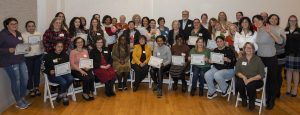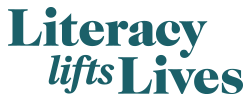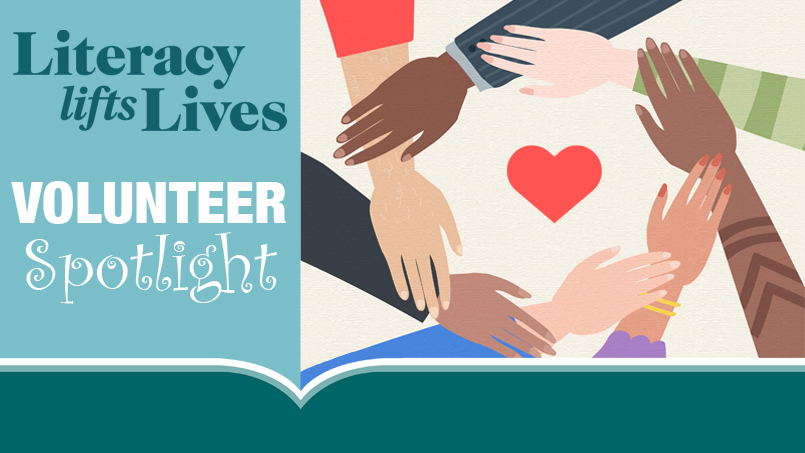Volunteer Spotlight: Meet Ed
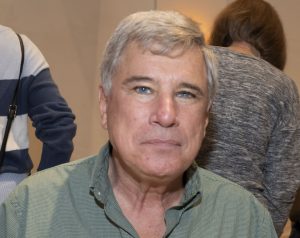 Ed Rose is known among his peers at the Literacy Council for his generosity and heart. In fact, the tutor’s end-of-semester gifts to his students are colorful handmade leather shawls he brings back from his trips to Cotacachi, a little village in Ecuador famous for its handmade leather goods. He is very impressed by how the local artisans can work with leftover leather patches in many different shapes and colors, stitching them together to create something unique. “There can be up to 15 colors in one shawl” he marvels.
Ed Rose is known among his peers at the Literacy Council for his generosity and heart. In fact, the tutor’s end-of-semester gifts to his students are colorful handmade leather shawls he brings back from his trips to Cotacachi, a little village in Ecuador famous for its handmade leather goods. He is very impressed by how the local artisans can work with leftover leather patches in many different shapes and colors, stitching them together to create something unique. “There can be up to 15 colors in one shawl” he marvels.
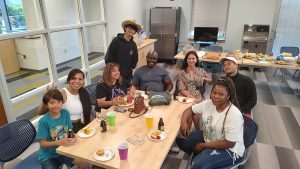 Ed can also be quite adept at making connections of a different kind. His talent lies in drawing together a diverse group of students in a learning environment, and this resonates with the delight he takes in his role. “Teaching is close to my heart; it energizes me,” he says. “It’s a give-back, and it allows me to be creative. I remember going through the Literacy Council’s [Tutor] Training and someone said, if you don’t laugh at least once a session, something’s wrong.” Ed says he tries to follow that advice and admits that he’s a bit of a ham, “but the students get a charge out of it, and I think it wakes them up.”
Ed can also be quite adept at making connections of a different kind. His talent lies in drawing together a diverse group of students in a learning environment, and this resonates with the delight he takes in his role. “Teaching is close to my heart; it energizes me,” he says. “It’s a give-back, and it allows me to be creative. I remember going through the Literacy Council’s [Tutor] Training and someone said, if you don’t laugh at least once a session, something’s wrong.” Ed says he tries to follow that advice and admits that he’s a bit of a ham, “but the students get a charge out of it, and I think it wakes them up.”
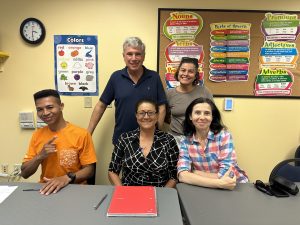 He started volunteering three years ago, tutoring one student at a time. By the end of his first year, he was tutoring four students, “which I liked all the more,” he notes. He has just finished the spring semester tutoring a class of 10 students, although he believes the number may have been around 14 at one point. Regardless of the numbers, the classes always go well.
He started volunteering three years ago, tutoring one student at a time. By the end of his first year, he was tutoring four students, “which I liked all the more,” he notes. He has just finished the spring semester tutoring a class of 10 students, although he believes the number may have been around 14 at one point. Regardless of the numbers, the classes always go well.
Ed initially thought his students would be largely Spanish speakers, but they speak a variety of languages. “I had Spanish, French, Chinese and Russian speakers, and they all formed bonds through helping with classwork or offering rides to class to those who need it, for example. They are intentional about communicating in English, and they also want to help one another achieve their goals.” His job is to help them get there. “I am impressed at how strong they are as individuals, especially because of what many of them lived through to get here.”
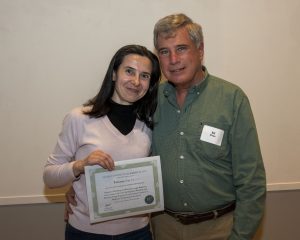 Rose focuses on learning what he, as their teacher, can give them. “I ask, why are you here? Why are you trying to learn English? What do you need?” He says that achieving that understanding often calls for keeping an open mind, especially considering the negative images of the U.S. many students became familiar with in their home country. Ed describes one student who was, from outward appearances, an introvert. Although he had been living in the U.S. for some time, he resisted talking to others, let alone making friends. In time, Ed realized that his background had made him fearful of trusting new people. “In fact, he believed he could get into some kind of trouble if he got close to someone from here,” Ed says. “I tried to assure him that wasn’t the case and that people weren’t put into jail for no reason! He started to open to the others, and now he’s a chatterbox. He even goes out of his way to talk with other students.”
Rose focuses on learning what he, as their teacher, can give them. “I ask, why are you here? Why are you trying to learn English? What do you need?” He says that achieving that understanding often calls for keeping an open mind, especially considering the negative images of the U.S. many students became familiar with in their home country. Ed describes one student who was, from outward appearances, an introvert. Although he had been living in the U.S. for some time, he resisted talking to others, let alone making friends. In time, Ed realized that his background had made him fearful of trusting new people. “In fact, he believed he could get into some kind of trouble if he got close to someone from here,” Ed says. “I tried to assure him that wasn’t the case and that people weren’t put into jail for no reason! He started to open to the others, and now he’s a chatterbox. He even goes out of his way to talk with other students.”
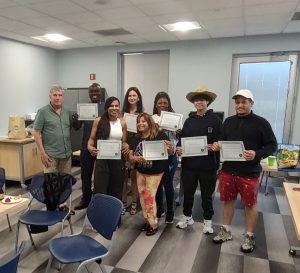 What would Ed share with would-be tutors who might have some hesitancy relating to people from very different backgrounds. “To me, the more diversity you can introduce in your life the better off you are, not only from understanding other people, but from how you also develop as a person. My mother used to say, ‘You’ll never be sorry for trying something new, but you frequently will regret not trying something.’
What would Ed share with would-be tutors who might have some hesitancy relating to people from very different backgrounds. “To me, the more diversity you can introduce in your life the better off you are, not only from understanding other people, but from how you also develop as a person. My mother used to say, ‘You’ll never be sorry for trying something new, but you frequently will regret not trying something.’
“I have never hesitated to try something new. And certainly, in working with the Literacy Council, what you get back greatly exceeds what you put into it.”